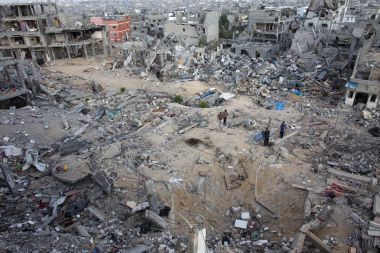Israeli airstrikes deliberately 'targeted inhabited family homes' says Amnesty International

Israeli airstrikes displayed a "callous indifference" towards civilian families during the latest war in Gaza, a report from Amnesty International has found.
Released today, Families under the Rubble: Israeli attacks on inhabited homes explores eight cases in which residential homes were attacked without warning during Operation Protective Edge. Over 100 civilians, including 62 children, were killed in these strikes.
"Israeli forces have brazenly flouted the laws of war by carrying out a series of attacks on civilian homes, displaying callous indifference to the carnage caused," said Philip Luther, director of the Middle East and North Africa Programme at Amnesty International.
"The report exposes a pattern of attacks on civilian homes by Israeli forces which have shown a shocking disregard for the lives of Palestinian civilians, who were given no warning and had no chance to flee."
According to Amnesty, "serious violations of international humanitarian law, including unlawful killings and injuries to civilians and destruction of civilian property" occurred during the 50-day war.
The report details the accounts of survivors who were forced to dig through the rubble of their homes in an attempt to find their families.
Khalil Abed Hassan Ammar, a doctor who works for the Palestinian Medical Council, lost three of his children in an attack on his home.
"I heard the whistle of the missile before it hit. We felt it really loud and realised it was going to hit us, or our building," he told Amnesty researchers.
"It went into my kids' bedroom...It turned out we were hit with two missiles. All of a sudden after the hit and after we realised what had happened, we couldn't hear the kids; their voices had completely gone that's when I realised they were all dead...It was terrifying; we couldn't save anyone.
"All of the kids were burnt. I couldn't tell which were mine and which were the neighbours'...Some of them were blown outside of the building through the windows and balconies."
Ammar said he only found the body of his eldest child, which had been blown to pieces. "I recognised his leg from his trousers," he recalled.
During the war, Israel began destroying large civilian structures rather than pinpointing suspected Hamas targets within them. A military spokesperson confirmed that some strikes were "a direct result to Hamas' decision to situate their terrorist infrastructure within the civilian sphere including schools, hospitals and high-rise buildings."
However, Amnesty argues that the level of devastation caused to innocent people was "clearly disproportionate" to any military advantage gained by Israel.
"Even if a fighter had been present in one of these residential homes, it would not absolve Israel of its obligation to take every feasible precaution to protect the lives of civilians caught up in the fighting," Luther said.
"The repeated, disproportionate attacks on homes indicate that Israel's current military tactics are deeply flawed and fundamentally at odds with the principles of international humanitarian law."
Amnesty is now calling on Israel to acknowledge the attacks, and to be held accountable under humanitarian international law.
"The Israeli authorities must provide answers. The international community must take urgent steps to end the perpetual cycle of serious violations and complete impunity," Luther said.
"Failing to allow independent human rights monitors into Gaza smacks of a deliberately orchestrated attempt to cover up violations or hide from international scrutiny. Israel must cooperate fully with the UN Commission of Inquiry and grant international human rights organizations such as Amnesty International immediate access to Gaza to prove its commitment to human rights."
At least 2,150 Palestinians and 73 Israelis died during the war sparked by the murder of three Israeli teenagers by Palestinian militants. An estimated 18,000 homes were entirely destroyed or rendered uninhabitable, and 108,000 people were left homeless.











